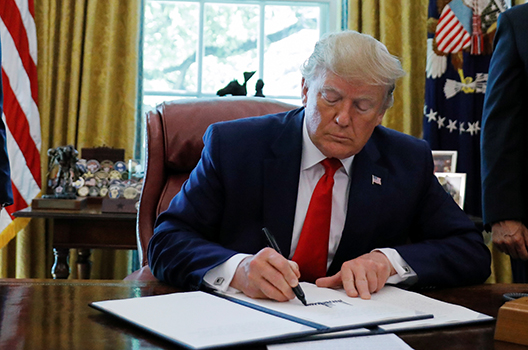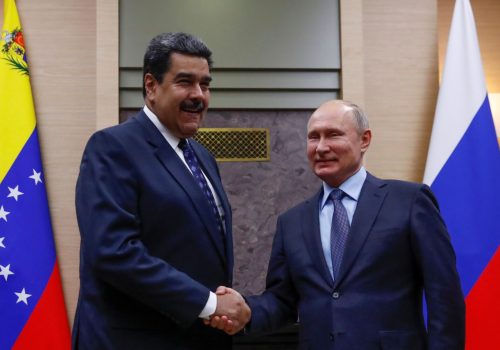US President Donald Trump is conducting policies of “maximum pressure” on two countries, Venezuela and Iran. In Venezuela, Russia’s state-owned oil company, Rosneft, actively undercuts this US policy by helping Caracas circumvent Washington’s tough economic sanctions. Yet Washington has not applied broad sanctions against the giant Russian company. In Iran, Rosneft may be playing an analogous role in undercutting what President Trump often refers to as “the toughest sanctions ever imposed on a country.”
A centerpiece of Trump’s “maximum pressure” campaign against the Maduro regime in Venezuela has been a steady tightening of economic sanctions, with a key focus on Venezuela’s state oil company, PDVSA. Fear of violating US sanctions has scared nearly all international companies—with the exception of Rosneft—away from PDVSA. For example, in January 2019, before Washington placed sanctions on PDVSA, Venezuela was importing gasoline, diesel, and other oil-derived fuels from several foreign suppliers; after the US sanctioned PDVSA, nearly all foreign oil companies and traders stopped supplying Venezuela.
Rosneft’s continued deliveries of petroleum-based fuels (including gasoline, diesel, and naphtha) provide Venezuela an economic lifeline because Venezuela’s own refineries are no longer functioning, thanks to years of mismanagement and underinvestment. Without fuel imports by Rosneft, Venezuela’s entire transportation system would grind to a halt, elevating the economic suffering of Venezuela’s citizens to unprecedented levels and catalyzing even greater political discontent.
Rosneft plays another crucial role in keeping Maduro afloat: marketing and arranging financing for PDVSA’s crude oil exports. As Elliott Abrams, the Trump Administration’s special representative for Venezuela, recently told the Financial Times, “Rosneft is really central to the regime’s survival. It is buying the oil that is produced, it is helping sell that oil, it is helping them arrange financing. Rosneft is really key here.” Rosneft, indeed, reportedly supplied all of Venezuela’s refined product imports in June 2019.
So, why has the Trump Administration not sanctioned Rosneft for its collaboration with PDVSA? After all, while current US sanctions against Venezuela only apply to US individuals and companies, US legislation provides the president discretion to enact new sanctions against any entity, foreign or domestic, that provides substantial support to PDVSA. Rosneft would therefore be a logical sanctions target, given its major role in thwarting Trump’s goal of collapsing the Maduro regime.
In the same conversation with the Financial Times, Abrams provided the answer, explaining that sanctioning Rosneft has been discussed by the Trump Administration, but in a broader framework of US-Russia relations: “We think about it in the context of our global relationship with Russia . . . Rosneft is clearly on the minds of everyone in Washington.”
Apparently, Rosneft’s central role in undercutting Trump’s Venezuela policy is insufficient to persuade the US president to exercise his discretionary authority and sanction Rosneft, which would actually maximize his “maximum pressure” on the Maduro regime. After all, Rosneft is of great importance to Russian President Vladimir Putin, both strategically and personally: Rosneft’s Chairman and CEO, Igor Sechin, has been one of Putin’s closest allies for the past two decades.
Meanwhile, it is plausible that Rosneft could also become involved in a similar effort to relieve the Trump Administration’s “maximum pressure” on Iran.
According to an October 2018 report in the Times of Israel, a source in Israel’s Foreign Ministry claimed that during their meeting on September 7, 2018, Putin and Iranian President Hassan Rouhani reached an agreement to circumvent US sanctions by shipping Iranian oil to Russia’s Caspian Sea ports, where it would then be refined into European-grade fuel and exported to Europe as Russian fuel. Rosneft would be the central Russian actor in this effort.
More recently, Moscow has signaled its general intent to help Tehran avert Washington’s sanctions against Iranian oil exports. In July 2019, Russia’s Foreign Ministry told the Financial Times that Moscow was willing to join INSTEX, the European Union (EU) payments channel aimed at circumventing US sanctions on trading with Iran. According to this arrangement, Iran would export goods into the EU and receive compensation in the form of basic commodities and medicines produced in the EU.
Tehran insists its oil exports be included in INSTEX, a demand to which the EU has not yet acceded. As the Financial Times reports, however, “Moscow has previously said that it would look into ways to facilitate or finance Iranian oil exports if INSTEX was not launched or proved ineffective.” Given Sechin’s longstanding quest for a strategic pact between Rosneft and the National Iranian Oil Company (NIOC), Rosneft would be expected to play a central role in such efforts to evade Washington’s sanctions.
These sorts of arrangements could include shipments of Iranian oil into Russia’s only ice-free port on the Caspian Sea, Makhachkala, according to Russian journalists based there. Dagjournal reported in early 2019 that Iranian oil could be shipped to Makhachkala and blended with crude from other suppliers, which would then be sold in Europe; in exchange, Iran would receive food, medicine, and other basic commodities.
Russian authorities have been investing heavily to expand the capacity of Makhachkala’s port. In 2018, crude oil imports at Makhachkala increased by 198 percent over the previous year, And, as of late October 2019, oil imports into Makhachkala doubled again over the preceding year.
These higher crude oil volumes in Makhachkala appear primarily to reflect imports from Turkmenistan and Kazakhstan. Previously destined for Azerbaijan, these shipments were diverted to Makhachkala in early 2019, thanks in part to a January 2019 transportation agreement between Vitol, perhaps the world’s largest oil trader, and Dragon Oil Turkmenistan Ltd. (a subsidiary of Emirates National Oil Company (ENOC)).
It is possible that some of these sorts of cross-Caspian oil shipments violate at least the spirit of US sanctions against Russia. For example, on February 2, 2019, the oil transport ship VF-Tanker 3 reportedly loaded crude in Turkmenistan’s port of Aladzha that had been produced by Dragon Oil and subsequently sold to Vitol, and then transported that oil to Makhachkala. The owners of VF-Tanker 3, VEB-Leasing OJSC, are subject to OFAC SSI sanctions, which aim to limit financing of activities by sanctioned persons.
In light of Moscow’s stated intent to help Iran evade the US’ oil-related sanctions, coupled with the strategic pact between Rosneft and NIOC, Washington should also examine whether clandestine oil tanker traffic might be occuring between Iran and the expanded port of Makhachkala. Iran has a history of clandestinely shipping oil via tankers that shut off their transponders before reaching port. According to Reuters, for example, Vitol purchased 2 million tons of fuel of Iranian origin in 2012, which involved clandestine ship-to-ship transfers with transponders silenced, and offered it to Chinese traders (though Vitol subsequently pledged not to purchase any more Iran-sourced fuel, and Vitol maintains that its business is compliant with all applicable legislation and sanctions). Moreover, it has become standard practice for Iranian tankers to shut off their transponders when nearing ports of delivery in other parts of the world, especially Syria.
Granted, the possibility that secret oil shipments are occurring between Iran and Russia via the Caspian Sea remains speculative at this point. But, the political intent of Tehran and Moscow to circumvent US sanctions is clear, and the upgraded capabilities of Makhachkala’s port are in place. The Trump Administration should therefore watch this space vigilantly if it hopes to make its “maximum pressure” campaign against Iran more effective than its one against Venezuela.
Matthew Bryza is a senior fellow with the Atlantic Council Global Energy Center. He served as a US diplomat for over two decades, including as US ambassador to Azerbaijan and deputy assistant secretary of European and Eurasian affairs. You can follow him on Twitter @BryzaMatthew
Subscribe to the Global Energy Center newsletter
Sign up to receive our weekly DirectCurrent newsletter to stay up to date on the program’s work.
Image: US President Donald Trump signs an executive order imposing fresh sanctions in the Oval Office of the White House in Washington, US, June 24, 2019. (REUTERS/Carlos Barria)


